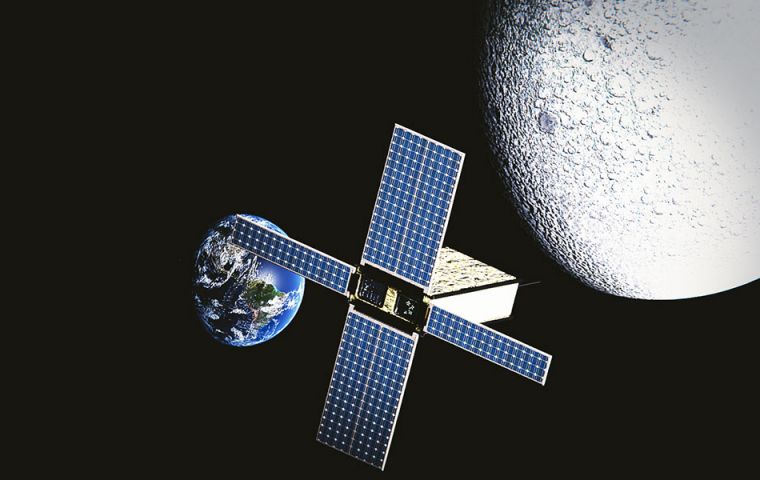MercoPress. South Atlantic News Agency
University of Sao Paulo targets the Moon for 2020
 The University of Sao Paulo aims at the Moon for 2020
The University of Sao Paulo aims at the Moon for 2020 According to a project announced Tuesday by the University of São Paulo, Brazil plans to launch its first mission to the moon in December 2020 with a nanosatellite to orbit the star to the effects of the space environment on different life forms.
The project, named Garatéa-L, brings together several major Brazilian space research institutions at a cost of 35 million reais (about 10.3 million dollars), Brazil's most prestigious university reported on its website.
The aim of the project is to send a probe to the lunar orbit, 384,400 kilometers from Earth, from where it would gather data on the lunar surface and conduct pioneering scientific experiments with human microbes, molecules and cells.
The initiative was presented by its main coordinator, space engineer Lucas Fonseca, founder of the company Airvantis, at an event at the School of Engineering of Sao Carlos of USP.
“The idea is that we can benefit from the recent revolution of nanosatellites, better known as cubesats, to place Brazil on the map of interplanetary exploration,” according to Fonseca, a USP researcher who worked at the European Space Agency and collaborated in the Rosetta mission, that in 2014 managed to pose a probe in comet 67P.
Fonseca gathered in the mission to entities such as the National Institute of Space Studies (INPE), the Technological Institute of Aeronautics of USP, the National Laboratory of Synchrotron Light and the Institute of Technology of the Pontifical Catholic University of Rio Grande do Sul. These institutions are already working on raising funds to finance the project and have the probe built in September 2019, when they commemorate the first 50 years of man's arrival to the moon. The nanosatellite would be sent aboard the Indian rocket PSLV-C11, which successfully sent a mission to the Moon in 2008 (Chandrayaan-1).
The launch would be carried out by two British companies and in partnership with the European Space Agency (ESA) and the UK Space Agency, which on the same flight would send the Pathfinder, the first deep space mission of commercial character.
The European agencies plan to place in the lunar orbit diverse nanosatellites, among them the Brazilian, with the support of a ship, that also would be in charge to guarantee the communications with Earth. “It's a unique opportunity to work with Europeans on a project that can elevate Brazil's ambitions to another level,” said Fonseca.
The project was named Garatéa, which in the Tupi-Guarani language means “looking for lives”, because its main objective is to study the effects of various colonies of living microorganisms, molecules and human cells that will be on board the satellite and exposed to Radiation for several months.
This experiment is coordinated by researchers from the National Synchrotron Light Laboratory and the Institute of Chemistry of USP.
An instrument to measure radiation levels in the lunar orbit will also be shipped on the satellite, the result of which is of interest for future long-term manned missions to the Moon.




Top Comments
Disclaimer & comment rules-

-

-

Read all commentsSaying the moon is a star is not correct....however, as far as the Portuguese language (original language of the article) is concerned, with regards to astrology ('astronomia'), they use the word “astro” to designate any celestial body orbiting in space..the sun, the moon, the planets....and stars...and the common translation for 'star' can be 'astro' in Portuguese....and vice-versa. Hence the confusion.
Nov 30th, 2016 - 11:29 pm +3@ ChrisR
Nov 30th, 2016 - 08:31 pm +2There have been a lot of errors lately, but I don't think the two words are similar in Portuguese so I doubt it's that.
As for why, why do we do any kind of exploration or science? Because we hope to learn something new, and possibly useful. It would be so cool if we can find life on other planets; it might be totally different to ours. And if there isn't perhaps we can put it there. The solar system contains loads of useful resources, and we really ought to get off this planet before we blow ourselves up.
Besides that, it's good for science in Brazil and hopefully will inspire some children.
@ ChrisR
Dec 03rd, 2016 - 06:09 pm +2You said yourself you're only doing it to keep your brain functioning, and it's not like you need the qualification. What course is it? It must be listed on their website.
Judging by what you described so far, and the way education works differently in the US, I'd guess MIT Physics 101 would correspond to A-Level topics in the UK. So it's not going to be impossible for anyone, although I'm sure no one would dedicate the time to do it unless they were interested.
It's a shame that most people are so scared of technical subjects really; I remember back when I was a student, people would ask what my degree was and look at me like I had two heads when I told them. Then they'd quickly change the subject.
It's a pity as well that no one is interested in the nanosatellites. Apparently any satellite under 10 kg is considered a nano, they are much cheaper than traditional ones, and they could be quite revolutionary when it comes to Earth imaging. They don't take as high resolution images, but because you can launch lots of them at once, you get updates much faster. This could be especially useful for things like disaster relief during earthquakes and hurricanes.
Commenting for this story is now closed.
If you have a Facebook account, become a fan and comment on our Facebook Page!